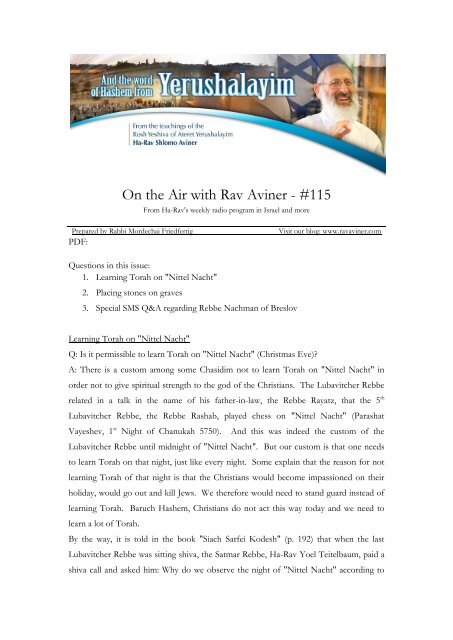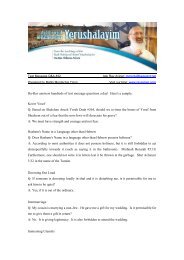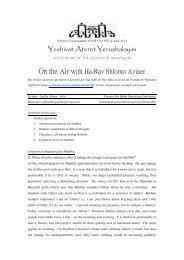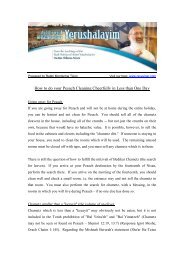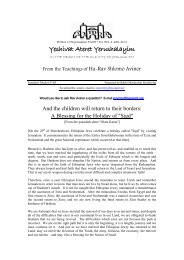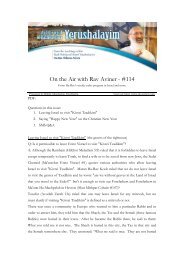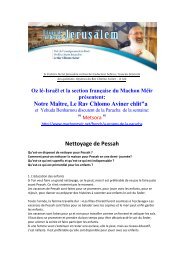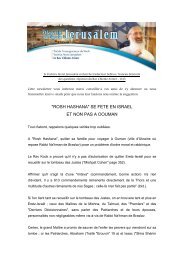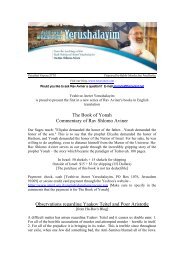On the Air with Rav Aviner - #115
On the Air with Rav Aviner - #115
On the Air with Rav Aviner - #115
You also want an ePaper? Increase the reach of your titles
YUMPU automatically turns print PDFs into web optimized ePapers that Google loves.
<strong>On</strong> <strong>the</strong> <strong>Air</strong> <strong>with</strong> <strong>Rav</strong> <strong>Aviner</strong> - <strong>#115</strong><br />
From Ha-<strong>Rav</strong>'s weekly radio program in Israel and more<br />
Prepared by Rabbi Mordechai Friedfertig Visit our blog: www.ravaviner.com<br />
PDF:<br />
Questions in this issue:<br />
1. Learning Torah on "Nittel Nacht"<br />
2. Placing stones on graves<br />
3. Special SMS Q&A regarding Rebbe Nachman of Breslov<br />
Learning Torah on "Nittel Nacht"<br />
Q: Is it permissible to learn Torah on "Nittel Nacht" (Christmas Eve)?<br />
A: There is a custom among some Chasidim not to learn Torah on "Nittel Nacht" in<br />
order not to give spiritual strength to <strong>the</strong> god of <strong>the</strong> Christians. The Lubavitcher Rebbe<br />
related in a talk in <strong>the</strong> name of his fa<strong>the</strong>r-in-law, <strong>the</strong> Rebbe Rayatz, that <strong>the</strong> 5 th<br />
Lubavitcher Rebbe, <strong>the</strong> Rebbe Rashab, played chess on "Nittel Nacht" (Parashat<br />
Vayeshev, 1 st Night of Chanukah 5750). And this was indeed <strong>the</strong> custom of <strong>the</strong><br />
Lubavitcher Rebbe until midnight of "Nittel Nacht". But our custom is that one needs<br />
to learn Torah on that night, just like every night. Some explain that <strong>the</strong> reason for not<br />
learning Torah of that night is that <strong>the</strong> Christians would become impassioned on <strong>the</strong>ir<br />
holiday, would go out and kill Jews. We <strong>the</strong>refore would need to stand guard instead of<br />
learning Torah. Baruch Hashem, Christians do not act this way today and we need to<br />
learn a lot of Torah.<br />
By <strong>the</strong> way, it is told in <strong>the</strong> book "Siach Sarfei Kodesh" (p. 192) that when <strong>the</strong> last<br />
Lubavitcher Rebbe was sitting shiva, <strong>the</strong> Satmar Rebbe, Ha-<strong>Rav</strong> Yoel Teitelbaum, paid a<br />
shiva call and asked him: Why do we observe <strong>the</strong> night of "Nittel Nacht" according to
<strong>the</strong> non-Jewish calendar (which is forbidden) instead of according to <strong>the</strong> Jewish calendar?<br />
The Lubavitcher Rebbe answered that we do not learn on that night in order not to give<br />
spiritual strength to <strong>the</strong> god of <strong>the</strong> Christians and we <strong>the</strong>refore observe it on <strong>the</strong> night<br />
that <strong>the</strong>y celebrate, which is according to <strong>the</strong>ir calendar. And – he added – we must<br />
<strong>the</strong>refore be aware when <strong>the</strong>y celebrate this holiday in <strong>the</strong> place we are located. In most<br />
places, <strong>the</strong>ir holiday is on December 25 th , but it o<strong>the</strong>r places it is on a different day (For<br />
example, January 6 th ). In such places, that is <strong>the</strong> night of "Nittel Nacht".<br />
But as we said, our custom is to learn a lot of Torah on that night. And Ha-<strong>Rav</strong> Moshe<br />
Sternbuch wrote that this custom was unknown in Lithuania and it is only a custom<br />
among Chasidim (Shut Teshuvot Ve-Hanhagot 1:551). And Ha-<strong>Rav</strong> Ovadiah Yosef has<br />
written that no such custom exists among Sefardic Jews (Shut Yabia Omer vol. 7 Yoreh<br />
Deah #20).<br />
Placing stones on graves<br />
Q: Why do we places stones on graves when we visit?<br />
A: To honor <strong>the</strong> deceased. When a person visits and places a stone, and <strong>the</strong>n visits again<br />
and places ano<strong>the</strong>r stone, and does so again and again, he shows that he is honoring <strong>the</strong><br />
deceased. It is permissible to clean <strong>the</strong> grave and remove <strong>the</strong> stones if one so wishes.<br />
SPECIAL SMS Q&A REGARDING REBBE NACHMAN OF BRESLOV<br />
Text Message Responsa<br />
Ha-<strong>Rav</strong> answers hundreds of text message questions a week. Some appear in <strong>the</strong><br />
parashah sheets "Ma'ayanei Ha-Yeshu'ah," "Olam Ha-Katan" and "Be-Ahavah U-Be-<br />
Emunah." Here's a sample:<br />
Q: Everyone agrees that Rebbe Nachman was a Tzadik and Torah scholar. Why <strong>the</strong>n are<br />
so many opposed to Chasidut Breslov?<br />
A: Those who are opposed are greater Tzadikim and Torah scholars and Rabbi Nachman<br />
does not have a monopoly on ei<strong>the</strong>r.<br />
Q: Ha-<strong>Rav</strong> wrote that Rebbe Nachman does not have a monopoly. Does <strong>Rav</strong> Kook?<br />
A: No, Maran Ha-<strong>Rav</strong> Kook also does not have a monopoly. <strong>On</strong>ly Moshe Rabbenu has<br />
a monopoly, in contrast to what Korach thought.<br />
Q: But <strong>the</strong>re is a spark of Moshe Rabbenu in every generation?<br />
A: Yes, but in all of <strong>the</strong> Torah scholars, and <strong>the</strong>y <strong>the</strong>refore have a monopoly toge<strong>the</strong>r.<br />
Q: Ha-<strong>Rav</strong> wrote that those opposed to Rebbe Nachman were greater Tzadikim and<br />
Torah scholars. Is it possible to compare Tzadikim and Torah scholars?<br />
A: Yes. See Baba Metzia 84b and Shut Mahari Brona #190.<br />
Q: How do we know that <strong>the</strong>y were greater than him?
A: Because Rebbe Nachman wanted everyone to follow his way and that "All of <strong>the</strong><br />
world be Breslov" (Chayei Mohara"n 339), but <strong>the</strong> reality is that <strong>the</strong> great Rabbis of<br />
Israel, including <strong>the</strong> great Chasidic Rabbis, did not become Breslov, and all of <strong>the</strong>m<br />
toge<strong>the</strong>r were certainly greater than him.<br />
Q: Perhaps those who argued <strong>with</strong> him did not understand <strong>the</strong> true depth of his<br />
teachings?<br />
A: It is also possible to say that he did not understand <strong>the</strong> true depth of those who<br />
argued <strong>with</strong> him.<br />
Q: From where do we know that <strong>the</strong>re were disputes <strong>with</strong> Rebbe Nachman?<br />
A: It is mentioned numerous times in <strong>the</strong> books of his students. It reached <strong>the</strong> point<br />
that he was forced to wander around. His students also mention that he was<br />
excommunicated in various places.<br />
Q: How can we say that people argued <strong>with</strong> him when today <strong>the</strong>re are many Breslovers?<br />
A: There were very few during his time. During <strong>the</strong> year of his death, <strong>the</strong>re were only<br />
sixty visitors to his grave on Rosh Hashanah, and it was <strong>the</strong> same for many generations.<br />
<strong>On</strong>ly recently have <strong>the</strong> numbers increased, especially among Ba'alei Teshuvah (<strong>the</strong> newly<br />
observant).<br />
Q: Ha-<strong>Rav</strong> wrote about <strong>the</strong> greatness of those who argued <strong>with</strong> Rebbe Nachman, but<br />
<strong>the</strong>y were not Torah scholars, such as <strong>the</strong> "Shpoler Zeide" (Rabbi Aryeh Leib of Shpola)<br />
who Rebbe Nachman called <strong>the</strong> Zeide of impurity and <strong>the</strong> Zeide of Satan.<br />
A: This does not make sense to me since Rabbi Aryeh of Shpola was a Torah scholar and<br />
a Tzadik. He performed acts of kindness his entire life for <strong>the</strong> Nation of Israel and gave<br />
all of his money to Tzedakah.<br />
Q: Rebbe Nachman said that this Tzedakah given by <strong>the</strong> fa<strong>the</strong>r of impurity was to nullify<br />
<strong>the</strong> Tzedakah given by <strong>the</strong> Nation of Israel.<br />
A: I also do not understand this.<br />
Q: Rebbe Nachman was certainly <strong>the</strong> greatest of all <strong>the</strong> Torah scholars, and he said that<br />
he wanted to write a book about how to act according to each halachah, but after he<br />
wrote Likutei Mohara"n <strong>the</strong>re was no need since everyone would understand how to rule<br />
in every halachah.<br />
A: Likutei Mohara"n is certainly very important but I do not understand how anyone<br />
could rule from it and I have never seen anyone do so.<br />
Q: <strong>On</strong>ly dry rationalists do not follow <strong>the</strong> path of Rebbe Nachman.<br />
A: Not all of <strong>the</strong> o<strong>the</strong>r great Rabbis of his generation were dry rationalists.<br />
Q: I am sure that Ha-<strong>Rav</strong> is saying <strong>the</strong>se things because you learned "Moreh Nevuchim"<br />
and Rebbe Nachman warned against learning this book.<br />
A: The Rama who appears in <strong>the</strong> Shulchan Aruch begins <strong>with</strong> a quote from "Moreh<br />
Nevuchim."<br />
Q: Isn't saying that <strong>the</strong>re were greater Torah scholars and Tzadikim in his generation<br />
shaming him?<br />
A: No, just as your statement that he was <strong>the</strong> greatest Tzadik and Torah scholar in his<br />
generation is not meant to shame o<strong>the</strong>rs.<br />
Q: But Rebbe Nachman said that all of <strong>the</strong> o<strong>the</strong>r Rabbis are like garlic skins compared to<br />
him (Chayei Mohara"n 190)?<br />
A: It is not understandable.<br />
Q: Why does Ha-<strong>Rav</strong> say that he does not have a monopoly when Rebbe Nachman<br />
himself said: "Today, when my book is already know and widespread, everyone is<br />
obligated to only learn my book" (Chayei Mohara"n 391)?<br />
A: All of <strong>the</strong> o<strong>the</strong>r Torah scholars did not agree. For example, Chabad.<br />
Q: Which great Rabbis opposed Rebbe Nachman besides <strong>the</strong> "Shpoler Zeide"?
A: Rebbe Nachman wanted everyone wanted to be Breslov but none of <strong>the</strong> great Rabbis<br />
followed his path.<br />
Q: Based on <strong>the</strong> opposition, shouldn't we wage war on Breslov?<br />
A: Even someone who is not Breslov should respect Rebbe Nachman since he was a<br />
great and holy person, and Hashem, in general, does not like wars.<br />
Q: I learn in a Hesder Yeshiva and every night I learn Likutei Moharan for a half hour.<br />
Should I stop? I also say <strong>the</strong> Tikun Klali and it gives me a good feeling.<br />
A: You should ask your Rosh Yeshiva. Each yeshiva has its own path and we should<br />
respect it. If you learn in a Yeshiva, you should trust <strong>the</strong> Rosh Yeshiva.<br />
Q: Why does Ha-<strong>Rav</strong> say that he does not understand when Rebbe Nachman says<br />
something difficult?<br />
A: Because Rebbe Nachman was a great and holy person and we must guard his honor<br />
and humbly admit that we do not understand. Even someone else who is not Breslov<br />
must respect him.<br />
Q: I have much difficulty <strong>with</strong> Rebbe Nachman. What should I think?<br />
A: He was a great Torah scholar but o<strong>the</strong>rs do not agree <strong>with</strong> him.<br />
Q: If he was a great Torah scholar how could he rule not to learn Moreh Nevuchim?<br />
And how could he say: "I am <strong>the</strong> only leader and <strong>the</strong>re is no leader like me"?<br />
A: I do not understand. We don't understand everything.<br />
Q: I heard that <strong>Rav</strong> Kook greatly respected Rebbe Nachman. Is this correct?<br />
A: It is correct. He learned much of his Torah but was not Breslover Chasid. Our<br />
Rabbi, Ha-<strong>Rav</strong> Tzvi Yehudah, also greatly respected him (Le-Netivot Yisrael vol. 1, pp.<br />
214-215), but was also not a Breslover Chasid.<br />
Q: I heard that our Rabbi, Ha-<strong>Rav</strong> Tzvi Yehudah, wanted to learn Rebbe Nachman's<br />
Torah in his youth, but Maran Ha-<strong>Rav</strong> stopped him. Is this correct?<br />
A: Correct. He said that one first needs a healthy heart and soul before learning Rebbe<br />
Nachman, i.e. he much learn o<strong>the</strong>r works first (Likutei Ha-Re'eiyah vol. 2, p. 262 and in<br />
my book Tzvi Kodesh p. 20).<br />
Special thank you to Fred Casden for editing "<strong>On</strong> <strong>the</strong> <strong>Air</strong>"


